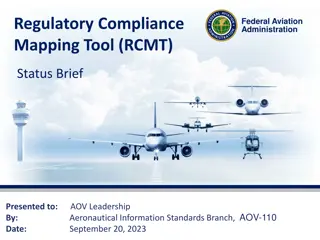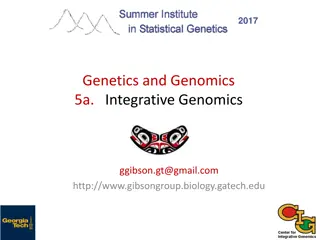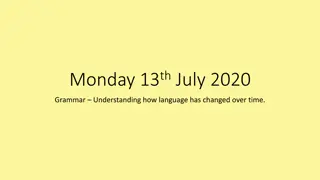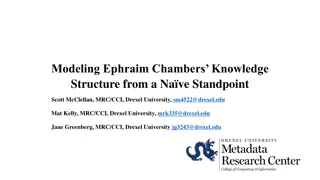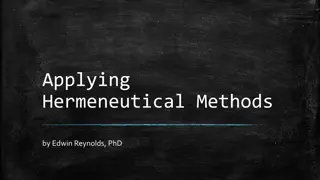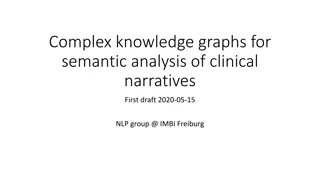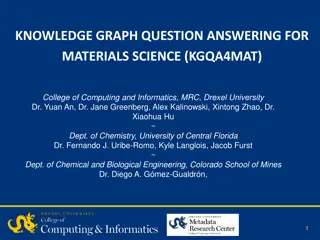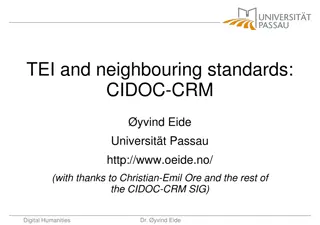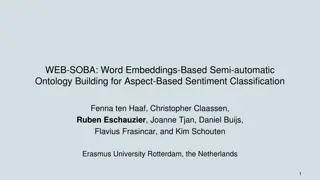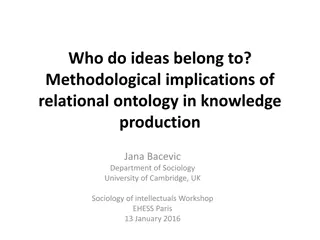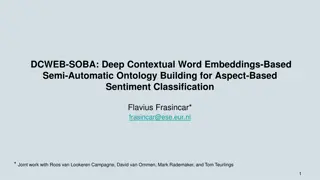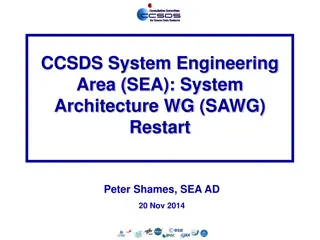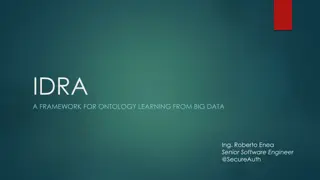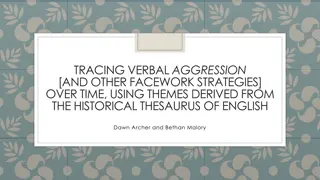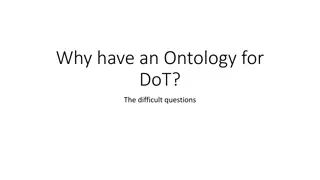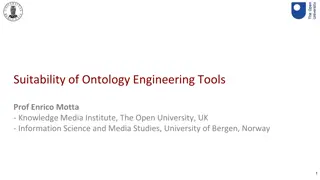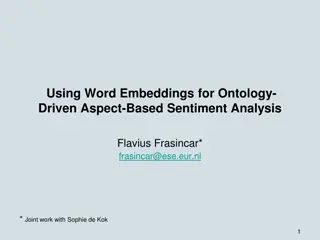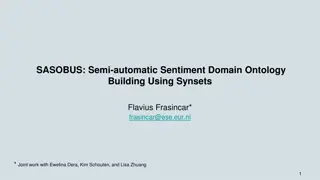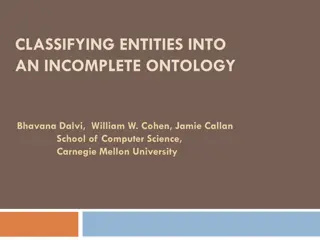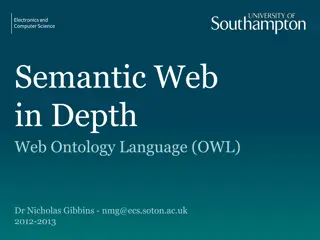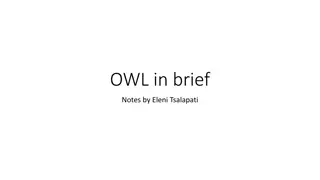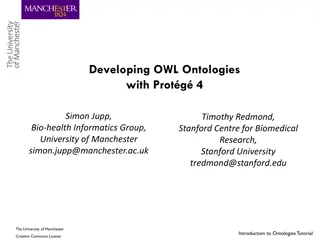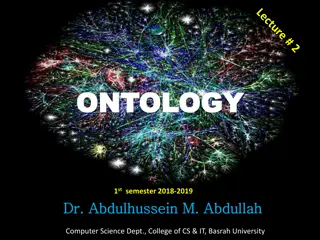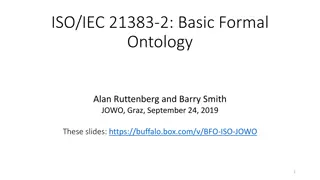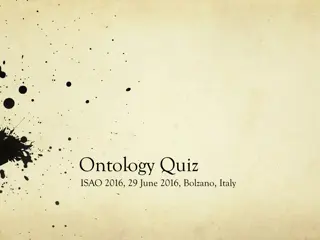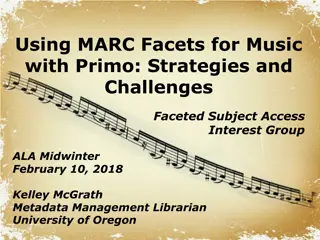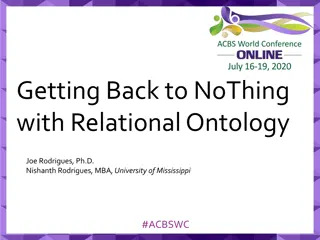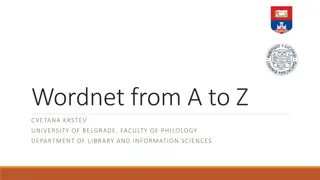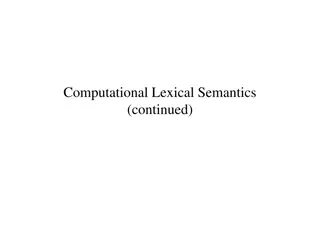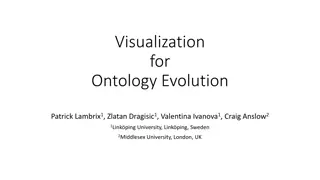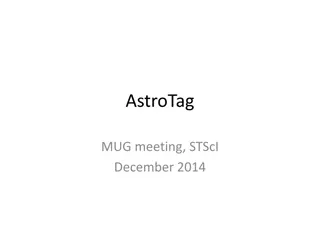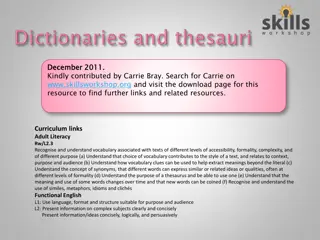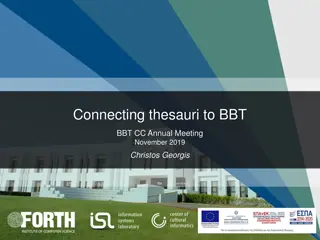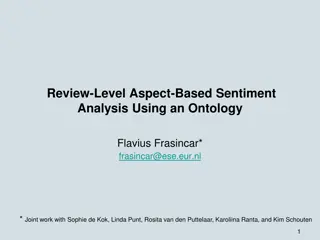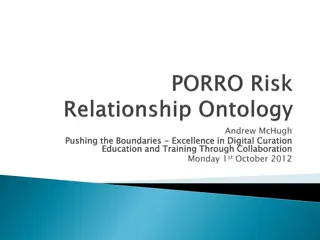Regulatory Compliance Mapping Tool (RCMT) Status Update - September 20, 2023
The Regulatory Compliance Mapping Tool (RCMT) Federal Aviation Administration status update for September 20, 2023, highlights significant achievements, including software development progress, document ingestion, ontology updates, user interface testing, and security framework enhancements. The RCM
0 views • 7 slides
Exploring Genetics and Genomics in Integrative Biology
Delve into the world of genetics and genomics through the lens of integrative biology, investigating the differences between cell types, the rationale for gene expression profiling, and the analysis of differential gene expression in various diseases. Uncover the significance of gene ontology, co-ex
0 views • 22 slides
Exploring Language Evolution: How Language Changes Over Time
Delve into the fascinating topic of language evolution by understanding how language has transformed over the years, reflecting changes in our lives, experiences, and cultures. Engage in activities to grasp the shifts in vocabulary usage and expressions, such as interviewing individuals about their
4 views • 27 slides
Understanding Knowledge Structure: Modeling Ephraim Chambers' Approach
Explore the significance of Chambers' Cyclopaedia published in 1728, focusing on its taxonomic tree structure and domain vocabulary. Learn about naive vs. informed modeling, the role of a Thesaurus/Ontology in expressing hierarchy, and the implications of talk exchanges in understanding knowledge st
1 views • 10 slides
Comparative Hermeneutics: Understanding Biblical Texts
Explore the application of hermeneutical methods on biblical texts such as Psalm 23 and 1 Tim. 2 through interpretation, translation, and contextual analysis. Delve into the meaning of texts, the role of signs and symbols, and the impact of varying presuppositions on interpretation. Reflect on the p
0 views • 46 slides
Semantic Analysis of Clinical Narratives Using Complex Knowledge Graphs
Need for improved semantic analysis of clinical narratives for information retrieval and decision support is addressed through the use of complex knowledge graphs. These graphs capture axiomatic descriptions of generalizable truths about entities in the medical domain, providing a language-independe
0 views • 8 slides
Advancements in Knowledge Graph Question Answering for Materials Science
Investigating natural language interfaces for querying structured MOF data stored in a knowledge graph, this project focuses on developing strategies using NLP to translate NL questions to KG queries. The MOF-KG integrates datasets, enabling query, computation, and reasoning for deriving new knowled
0 views • 13 slides
Interconnected Cultural Heritage through TEI and CIDOC-CRM
Explore the interconnectedness of cultural heritage using Text Encoding Initiative (TEI) and CIDOC-CRM standards, as discussed by Dr. Øyvind Eide in the field of Digital Humanities. Discover how TEI documents can be enriched with ontology, facilitating a deeper understanding of historical data and
2 views • 13 slides
WEB-SOBA: Ontology Building for Aspect-Based Sentiment Classification
This study introduces WEB-SOBA, a method for semi-automatically building ontologies using word embeddings for aspect-based sentiment analysis. With the growing importance of online reviews, the focus is on sentiment mining to extract insights from consumer feedback. The motivation behind the researc
2 views • 35 slides
Understanding Relational Ontology and Knowledge Production in Sociology
This academic exploration delves into the concept of relational ontology and its methodological implications in knowledge production, focusing on the ownership of ideas and the role of intellectuals as knowledge producers. It discusses the foundational singularity, the generative significance of con
0 views • 12 slides
Semi-Automatic Ontology Building for Aspect-Based Sentiment Classification
Growing importance of online reviews highlights the need for automation in sentiment mining. Aspect-Based Sentiment Analysis (ABSA) focuses on detecting sentiments expressed in product reviews, with a specific emphasis on sentence-level analysis. The proposed approach, Deep Contextual Word Embedding
0 views • 34 slides
CCSDS System Architecture WG Restart Summary
System Architecture Working Group (SAWG) is restarting to refresh the CCSDS Reference Architecture for CMC. The motivation stems from the need to update the outdated RASDS and align it with evolving standards and projects. The plan includes incorporating operational, physical, and service viewpoints
0 views • 9 slides
Framework for Ontology Learning from Big Data with IDRA
IDRA (Inductive Deductive Reasoning Architecture) presents a comprehensive framework for ontology learning, focusing on data modeling and architecture components. ETL (Extract Transform Load) processes play a vital role in semantic enhancement of data, especially in identity and access governance co
0 views • 25 slides
Tracing Verbal Aggression and Facework Strategies Over Time
Dawn Archer and Bethan Malory explore the tracing of verbal aggression and other facework strategies over time using themes from the Historical Thesaurus of English. They utilize automated content analysis tools to analyze datasets from various historical periods and propose solutions for prioritizi
0 views • 41 slides
Importance of Ontology in System Development for DoT
Ontology plays a crucial role in the development of systems for DoT by facilitating the automation of tasks, improving consistency, and enhancing the efficiency of tool chains. It enables the transformation of semantic descriptions into algorithms, streamlining processes and reducing the need for ma
0 views • 7 slides
Challenges and Opportunities in Ontology Engineering Tools
Prof. Enrico Motta discusses the limitations of current ontology engineering tools, emphasizing the need for better support for creating ontological specifications. The lack of tools that offer a knowledge-level perspective and assist in sensemaking, navigation, and identifying relevant definitions
0 views • 5 slides
Using Word Embeddings for Ontology-Driven Aspect-Based Sentiment Analysis
Motivated by the increasing number of online product reviews, this research explores automation in sentiment mining through Aspect-Based Sentiment Analysis (ABSA). The focus is on sentiment detection for aspects at the review level, using a hybrid approach that combines ontology-based reasoning and
0 views • 26 slides
BabyDayOut Ontology: Describing Picture with Classes, Instances, and Relations
Ontology "BabyDayOut" is developed using RDF/RDFS to describe a picture. It includes classes such as Person, Animal, Baby, Picture, Man, and Gorilla with instances like John, KingKong, Jack, Peter, and Alex. Various relations like hasFriend, hasAnimalFriend, sonOf, depicts, hasEnemy, and hasTitle ar
0 views • 9 slides
SASOBUS: Semi-Automatic Sentiment Domain Ontology Building Using Synsets
Building on the need for automation due to the increasing volume and significance of online reviews, SASOBUS focuses on Aspect-Based Sentiment Analysis (ABSA). The motivation behind SASOBUS lies in the growth of sentiment mining for product reviews, particularly at the sentence level. Its approach i
0 views • 36 slides
Understanding Contexts: A Meta-Ontological Approach
Ontologies provide a general representation of reality, but knowledge is mostly context-dependent. Analyzing different types of contexts, from linguistic to manufacturing, remains a challenge. This study aims to deepen the understanding of the ontological nature of contexts by leveraging a meta-onto
0 views • 14 slides
Classifying Entities into an Incomplete Ontology: Exploratory EM Approach
The research discusses methods for hierarchical classification of entities into incomplete ontologies. It explores the challenges of evolving web-scale datasets and the need for classifying entities in an incomplete ontology structure. The Hierarchical Exploratory EM model is detailed, providing ins
0 views • 27 slides
Understanding OWL (Web Ontology Language) in Depth
Delve deep into the intricacies of OWL, a powerful ontology language designed for instance classification, consistency checking, and subsumption reasoning. Explore its features, versions, species, and trade-offs between expressiveness and reasoning complexity.
0 views • 76 slides
Understanding Web Ontology Language (OWL) in a Nutshell
Web Ontology Language (OWL) is a powerful tool for ontology modeling, allowing the creation of complex structures and relationships. OWL encompasses entities, expressions, and properties, enabling detailed descriptions of domains through axioms. The language supports both object and data properties,
0 views • 39 slides
Introduction to Developing OWL Ontologies with Protégé 4
Explore the world of developing OWL ontologies with Protégé 4 through a comprehensive tutorial by Simon Jupp and Timothy Redmond from Stanford Centre for Biomedical Research and the University of Manchester. Learn about OWL introduction, Protégé 4 interface, compositional approach, and the signi
0 views • 44 slides
Introduction to Ontology in Computer Science
Ontology is the study of existence, with applications in various fields like philosophy, linguistics, and computer science. In computer science, an ontology is an engineering artifact that defines a specific vocabulary to describe a domain, along with explicit assumptions about the vocabulary's inte
0 views • 33 slides
Understanding ISO/IEC Standards and Ontologies in Information Technology
Exploring the world of ISO/IEC standards and formal ontologies as presented by Alan Ruttenberg and Barry Smith at JOWO Graz in 2019. The slides cover topics such as basic formal ontology, connectors, domain ontologies, top-level ontologies, and the requirements for being a top-level ontology. ISO/IE
0 views • 97 slides
Ontology Quiz: Test Your Knowledge on Computational Logic and Philosophy
Delve into the world of ontology with this quiz featuring questions on computational complexity, mereology, standardization of OWL, and foundational ontologies. Test your understanding on topics such as first-order predicate logic, parthood in mereology, and more. Challenge yourself and expand your
0 views • 45 slides
Strategies and Challenges in Using MARC Facets for Music with Primo
This presentation explores the utilization of MARC facets for music in Primo, discussing the strategies and challenges involved in enhancing subject access for music resources. Topics covered include instrumentation in LCSH, MARC 048 codes for musical instruments, and the Library of Congress Medium
0 views • 45 slides
Exploring Relational Ontology and Its Philosophical Implications
Delve into the fascinating realm of relational ontology, where concepts like the nature of existence, the essence of things, and the interconnectedness of all are dissected. From traditional Western perspectives to Eastern philosophies, this exploration challenges conventional views on reality, emph
0 views • 16 slides
Overview of WordNet: History, Definition, Authors, and Usage
WordNet is a lexical database for the English language, grouping words into synonym sets, providing definitions, and recording relations among these sets. It serves as a dictionary and thesaurus, with primary use in text analysis and AI. Created at Princeton University under George Miller and direct
0 views • 59 slides
Writing Score Improvement Strategies & Tips
Improve your writing score by adding more detail, using transition words, varying sentence usage, enhancing word choice, and checking conventions. Utilize resources like a thesaurus and Office 365 to refine your writing. Vary sentence structure and identify strengths in your writing to enhance perfo
0 views • 11 slides
Understanding Word Sense Disambiguation in Computational Lexical Semantics
Word Sense Disambiguation (WSD) is a crucial task in Computational Lexical Semantics, aiming to determine the correct sense of a word in context from a fixed inventory of potential word senses. This process involves various techniques such as supervised machine learning, unsupervised methods, thesau
0 views • 67 slides
Visualizing Ontology Evolution for Improved Knowledge Management
Ontologies are dynamic entities that evolve over time, impacting semantically-enabled applications and knowledge acquisition. This work focuses on identifying desired functionalities for ontology evolution systems, highlighting the steps involved in ontology evolution, and emphasizing the importance
0 views • 16 slides
Enhancing Data Organization and Retrieval through Thesaurus-Enabled Tagging
Explore the significance of data tagging and association with concepts using a thesaurus. Learn about the benefits of tag hierarchies, concept relationships, and customized data delivery options. Discover how automated and manual associations between data sets and papers can streamline research proc
0 views • 16 slides
Vocabulary Skills and Resource Exploration
Explore the nuances of vocabulary, the differences between dictionaries and thesauruses, and the importance of using these tools effectively. Discover how to enhance your language skills through dictionary definitions, synonym identification, and the use of a thesaurus. Engage in activities to stren
0 views • 8 slides
Semantic Tool for Personal Information Protection
Semantic Tool for the Protection of Personal Information Act is a project led by Yahlieel Jafta, aiming to establish a knowledge base using ontology to assist individuals and organizations in interpreting the Act. The project focuses on the importance of ontologies in extending knowledge and enablin
0 views • 17 slides
Enhancing Thesaurus Connectivity at BBT CC Annual Meeting
Exploring the integration of local thesauri with BBT at the BBT CC Annual Meeting in November 2019, focusing on maintenance, accessibility, and the update mechanisms of the DARIAH-EU federated thesaurus. Learn about the processes behind updating, connecting, and maintaining these valuable resources
0 views • 13 slides
Ontology-Driven Review-Level Aspect-Based Sentiment Analysis
This study presents an innovative approach to sentiment analysis at the review level, focusing on aspect-based sentiment analysis (ABSA) using ontologies. Motivated by the increasing volume of product reviews online, the research addresses the challenge of detecting sentiment associated with aspects
0 views • 30 slides
Comprehensive Guide to Ontology Editors and IDEs for Ontologies
Explore a wide range of Ontology Editors and Integrated Development Environments (IDEs) for managing ontologies efficiently. From simple text editors to advanced IDEs like Protégé and Web Protege, learn about various tools and syntax options available. Dive into Ontology Editors like Protégé 4.3
0 views • 16 slides
Advancing Digital Preservation Through Risk Assessment and Ontology
Explore the innovative approach of utilizing risk assessment methodologies and ontology to enhance digital preservation strategies. Learn how these tools help in identifying risks, mapping mitigation measures, and aligning real-world objectives with preservation goals for effective management of dig
0 views • 11 slides
